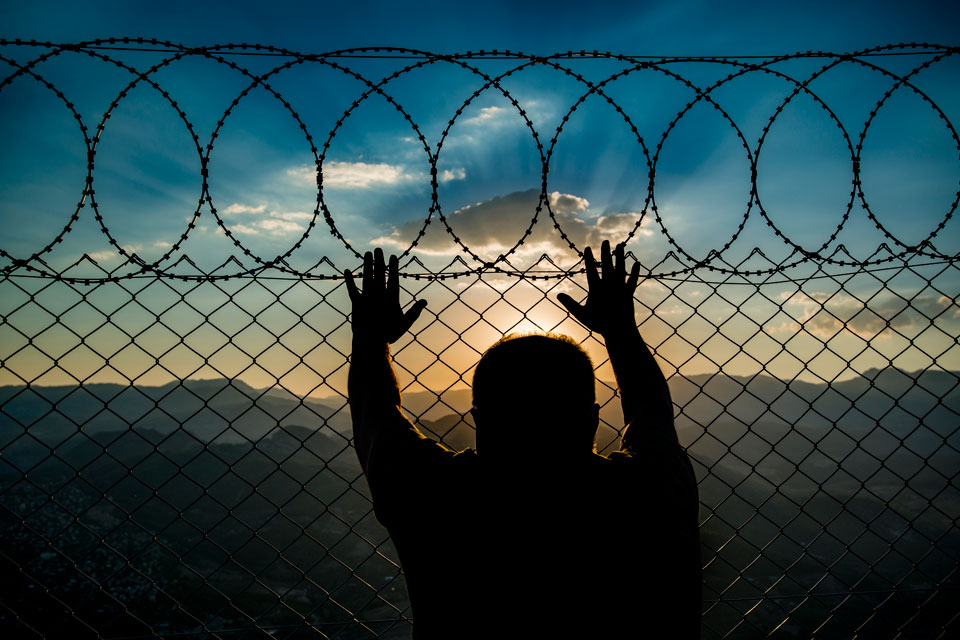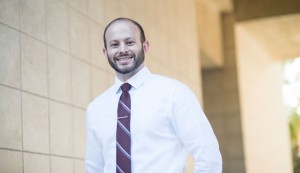Private Prison Operators Are Influencing Immigration Policy, According to New Study by CSUN Professor

A new study by CSUN political science professor links punitive immigration legislation to those members of Congress who have private prisons in their districts. Photo by ©iStockphoto.com/sezer66
If you are a member of the U.S. House of Representatives with a private prison in your district, you are also more likely than your peers to co-sponsor punitive immigration legislation, according to a groundbreaking study by California State University, Northridge political science professor Jason Morin.
Private prison stock soared following President Donald Trump’s election in 2016. Given Trump’s harsh immigration rhetoric throughout his campaign, many investors saw his words as a signal that the U.S. detainee pool would substantially increase during his administration, and the need for facilities to house those detained would grow.

Jason Morin
“Just prior to the 2016 election, President Obama issued a directive to phase out the federal government’s use of private prisons, and private prison stocks fell sharply,” Morin said. “Trump’s election changed all that, though, as he sent clear signals to investors that his administration would be more supportive of the private prison industry than the prior administration. The financial stake for the private prison industry was incredibly high in the last presidential election.”
Given the private prison industry’s growing role in the detention of undocumented immigrants, Morin and his colleagues at the University of California, Riverside — political science professor Loren Collingwood and political science doctoral student Stephen Omar El-Khatib — decided to explore whether the industry’s influence on immigration policy was growing as well. The results of their research were published this month in the journal Race and Social Problems in the article “Expanding Carceral Markets: Detention Facilities, ICE Contracts, and the Financial Interests of Punitive Immigration Policy.”
“We argue that private prison companies systematically influence House representatives politically when private prisons are located in their congressional district,” Morin said.
After decades of “tough on crime” sentencing that forced governmental bodies to contract with private prison operators to ease the overflow of incarcerated individuals, those same companies are now facing a drop in crime rates and changes to criminal justice policy, particularly at the state level. According to the study, the private prison industry in the United States is controlled by “an oligarchy” of corporations, including CivicCore (CCA), The GEO Group, Management & Training Corporation, Emerald Correctional Management and LaSalle Corrections. They generate billions in revenue each year.
“The two largest companies, CCA and The GEO Group, combined made $3 billion in one year, 2016, alone,” Morin said. “With overall crime rates decreasing, private prison companies naturally look for new ‘markets.’”
The researchers noted that “with a population of 11 to 12 million undocumented immigrants residing in the United States, immigrant detention is a natural growth area for companies interested in profiting off of human capture and containment.”
Using data collected from several sources — including VoteView and The Congressional Bills Project, as well as through Freedom of Information Act requests — Morin and his colleagues assessed support for proposed punitive immigration legislation among members of the 113thand 114thCongresses, which spanned from 2013-15 and 2015-17, respectively. They focused specifically on bills that, if implemented as law, had a high probability of increasing immigration enforcement and detention of undocumented people.
Morin and his colleagues then mapped the 206 detention centers that contracted with U.S. Immigration and Customs Enforcement (ICE) prior to the start of the 113thCongress in 2013. By pinpointing the districts represented by the congressional co-sponsors of each of the bills, the researchers found clear support for what they termed the “carceral representation hypothesis,” across party lines.
Their research found that “legislators representing districts where private prison companies contract with ICE to manage or own detention facilities disproportionately co-sponsor punitive immigration legislation designed to increase immigration detention via tough enforcement laws.”
Morin noted that despite evidence to the contrary, prison development is often considered an economic boon by politicians and rural communities, who are looking for replacements for more traditional industries, such as manufacturing or agriculture, that have moved out of their areas.
“By facilitating a perception of economic dependence within legislative districts, private prison companies systematically influence other types of legislation to increase the supply of detainees,” the researchers wrote in their report.
“What we are suggesting,” Morin said, “is that members of Congress are representing the financial interests of private prison companies, which poses a serious ethical problem since companies like The GEO Group and CoreCivic profit from the incarceration of immigrants.”

 experience
experience